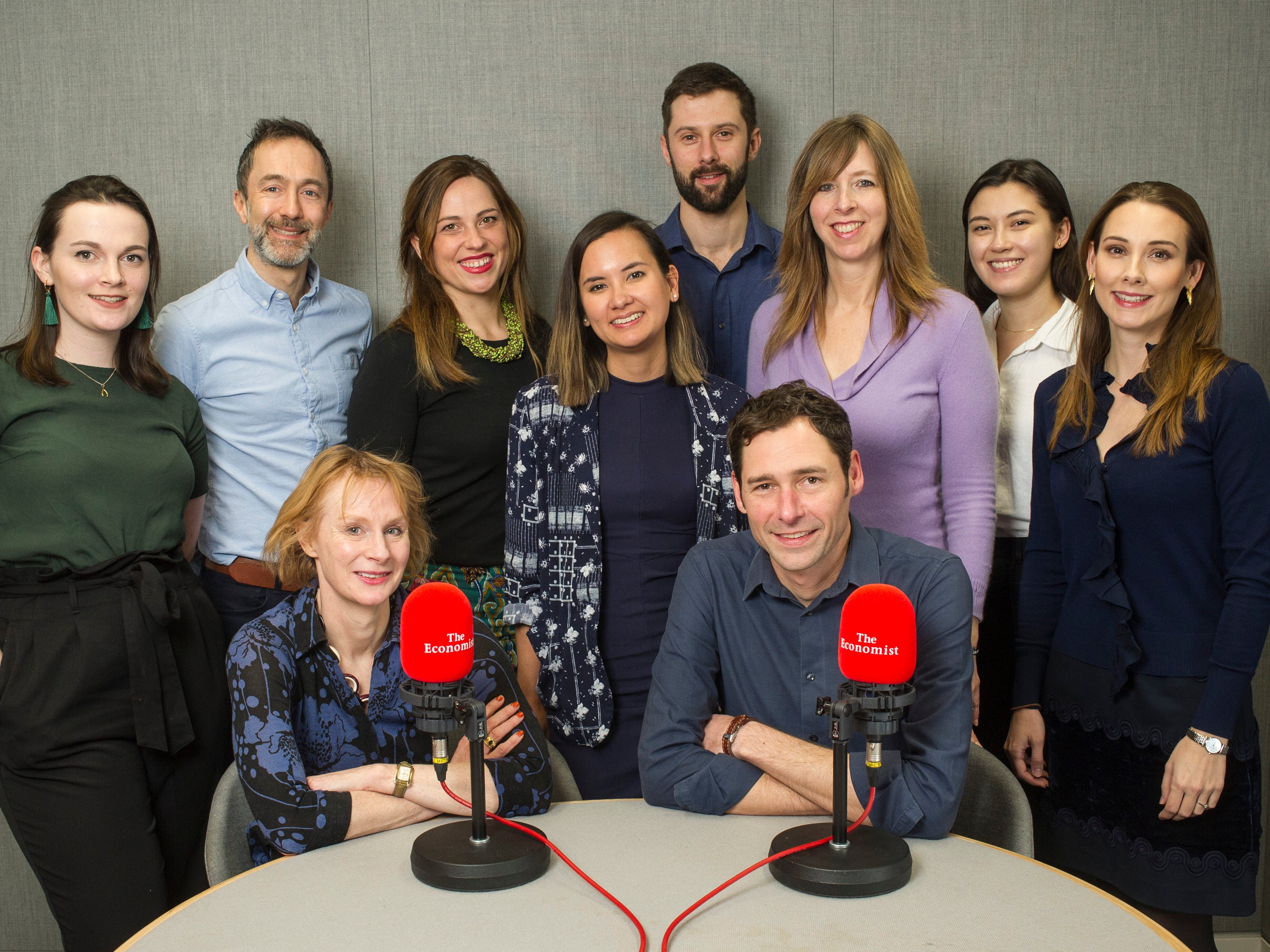
The Economist has launched a new daily podcast that draws on its “transatlantic DNA” to deliver current affairs to both morning commuters in the US and late-morning listeners in the UK.
The Intelligence promises a deeper dive on the big news stories, but away from the “hamster wheel” of daily news, according to head of Economist Radio Anne McElvoy.
It is free to download – sitting outside the Economist’s paywall – and goes out at 11am in the UK and 6am (ET) in the US.
The show, which launched on Tuesday, runs for about 20 minutes and is hosted by ex-BBC journalist and former physicist Jason Palmer (pictured front right), himself an American.
Although based in London with a team of eight editors and producers, the podcast is “completely global”, McElvoy (pictured front left) told Press Gazette.
“We are going to have a really good transatlantic bridge on the show. We are going to cover the US really well, but also get around and see how things look from other perspectives, such as China.”
She said the majority of Economist subscribers are US-based and that the newsbrand hoped to “deepen engagement” with news consumers Stateside and bring them “into the Economist world”.
The Economist claims 8m downloads a month across its seven podcast shows and hopes to double its reach with the launch of The Intelligence.
The US makes up less than 50 per cent of Economist radio listeners, while the UK and Europe represent a “good chunk”, with the group seeking growth both here and across the pond.
While The Intelligence runs some ads, McElvoy said podcasts were more broadly useful as a “window” into the rest of its output and as a means of inviting listeners to become subscribers.
“Many newcomers to a media brand are not starting out by reading print products,” she said. “Audio is a great medium for recruiting them and offering more value to existing subscribers
“We do very well commercially in broadcasting – we don’t feel [launching The Intelligence] is a terrible risk.”
Audio is a “decent source of revenue” for the Economist, added McElvoy. She said the group has a “strategic commitment” to it, but would not go into further commercial details.
“We think it really is a way to open up the Economist world,” she said, adding it was undertaken “in that spirit” rather than as a purely commercial venture.
In the few days that The Intelligence has aired, topics covered have ranged from the usual – read Brexit – to the unusual, such as Cubans’ use of condoms for fishing. “We don’t want to just do another news 24 or chat around the table about Mrs May,” said McElvoy.
“We all know what is happening, but we don’t really know what to make of it,” she added. “I think that goes whether you are listening as a Brexit-interested listener in the UK or listening to it in Denver, USA.”
She said the podcast aims to cover the news that “matters” in an Economist style, adding: “We won’t always follow the agenda of the networks. We do have a team with a lot of news and broadcast experience, but it distinguishes from the offer which is led out of a print newsroom.
“I do think there is an appetite for more considered current affairs and getting off the hamster wheel… it’s great to be news aware, but I think it’s great to be able to say today we are just going to do a big deep dive on Facebook, its business model and questions around it.
“I would be surprised in the next few days if we didn’t lead on a really big business story or leading technology story.”
What The Intelligence claims to offer above other podcast-producing news organisations is its global network of journalists.
“We have got an amazing network of correspondents, which regretfully a lot of organisations have had to scale back on, and we do have people around the world doing fascinating things,” said McElvoy.
“We are determined to have some fun, which is possibly not the word usually associated with the Economist, but when you get out there and meet our editors you see a lot of things.
“This is the best chance we’ve had to open these doors a bit.”
Picture: The Economist
Email pged@pressgazette.co.uk to point out mistakes, provide story tips or send in a letter for publication on our "Letters Page" blog
